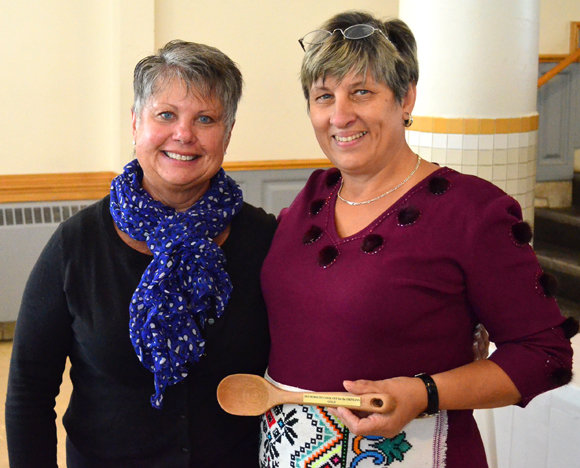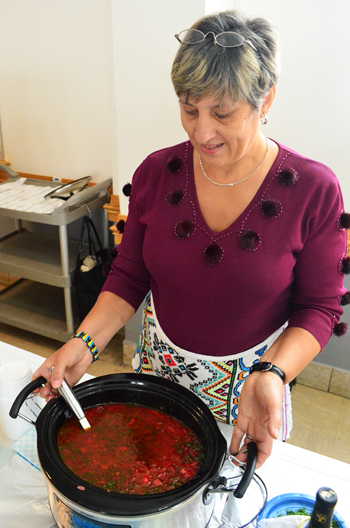By Jack Lawson –
The Ukrainian Orthodox Cathedral was host to its third annual Borsch Off on Feb. 22, and raised $1,140 for orphans in central Ukraine.
Over 70 visitors were on hand to sample 13 different borsch; a soup of Ukrainian origin that is popular in many Eastern and Central European cuisines and is made with beetroot as the main ingredient. The cooks were dressed colourfully behind their pots, slow cookers, and dishes of sour cream. Guests sampled, and voted for their favourites.

“We had so many people come out. This is the third year that we’ve done this, and every year gets better,” says Irene Carman, one of the event organizers.
“As the process goes on, we see more volunteers, and how there could be more events like this.”
First place went to Raisa Hordichuk, second place to Olesya Shevchenko, and third to Inna Artychuk.
“We had a great group of chefs out,” says Olena Stetskevych one of the two co-chairs of the event. “Everyone seemed to have a really great time.”

Although Hordichuk, a professional caterer, doesn’t use a recipe she did share some of her tips for KT readers.
“The potatoes need to be thinly sliced, like little squares,” says Hordichuk. “Sour cabbage is better for winter borsch, and you should always use stock with the bone in.”
Hordichuk’s winning borsch was served with garlic bread and dill. The borsch itself was filled with soft flavours, almost buttery, and a little tart.
The winner for best presentation went to Tamara Rudenko. While borsch is often thought of as a hearty dish in the winter, Rudenko turned it into a kind of cocktail. The borsch, finely puréed, was placed into a tall shot glass, and topped with sour cream and dill.
Donations were placed in a big soup pot. People gave what they could and the organizers didn’t charge a cover. Money raised from the cook-off will go to help 58 orphans who live at Orphanage #2 in Kryviy Rih, Ukraine. Some are disabled and nearly half live with HIV.
The funds will go towards socks, underwear, towels, blankets, shampoo, toothpaste, and toilet paper.
Orphans graduate from orphanage life when they turn 17. Most of them end up in hostels or shared living situations. To help, the Ukrainian Orthodox Cathedral will be providing grads with pots, pans, plates, cups, and towels – the kinds of objects anyone would need when moving out on their own for the first time.
As the conflict in Ukraine continues to escalate, the focus has shifted even more to the bare necessities.
“This fundraising is important every year, but especially this one,” says Stetskevych.